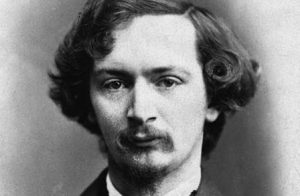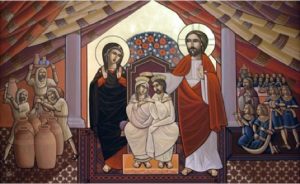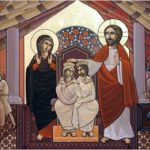Wine of everlasting joy
John 2:1-11
1.
And so to the famous episode from St John’s gospel. Jesus turns water into wine, appearing as the bringer of joy, the bringer of festival.
This episode is called a “sign” (semeion). It is a symbolic story, a story of real depth.
In the text Jesus turns six large stone jars of water into wine. Here is a superabundance of joy, to scandalise the prudish interpreters of the Victorian era.
Jesus seems something like the Greek wine God, Dionysus—or Bacchus, as the Romans knew him. Perhaps you have seen images of the pagan god, a ripe cluster of grapes upon his lips.
Yes, Jesus in this depiction is far from the “pale Galilean” of Pagan imagining. A pale Galilean – that is how, according to legend, the last pagan emperor, Julian the Apostate, disparaged Jesus. The poet, Algernon Swinburne, imagined Julian on his deathbed saying “thou hast conquered, O pale Galilean; the world has grown grey from thy breath.” (Vicisti, Galileae)
But, you see, it is not like that at all!
 Let’s dwell a little longer on that poem – since it might just help us interpret today’s text.
Let’s dwell a little longer on that poem – since it might just help us interpret today’s text.
The old emperor longs for death—for the sleep of death, for blessed release. He has had enough of living, enough of sex, of wine, of harp, of flute. He has had enough of all life’s endless desire. So he prays to the Goddess Proserpina for death:
I have lived long enough, having seen one thing, that love hath an end;
goddess and maiden and queen, be near me now and befriend.
Thou art more than the day or the morrow, the seasons that laugh or that weep;
for these give joy and sorrow; but thou, Proserpina, sleep.
Sweet is the treading of wine, and sweet the feet of the dove;
but a goodlier gift is thine than foam of the grapes or love.
Yes, to old Julian, death itself was better than foam of the grapes, or even love.
2.
But was he right?
Does love come to an end?
So to today’s reading. Jesus turns water into wine.
Those six stone jars are, we hear, for the Jewish rite of purification—for the ritual cleansing of the dead. For the Hebrews poured cold water on the corpse of one recently dead, as a purification. These waters, these waters of death, Jesus turns to wine.
 He does not turn them into the wine of momentary intoxication, not into the wine that brings life and love for a moment—but into the wine that endures without end. So I am sorry to side with the old temperance preachers: this wine is symbolic.
He does not turn them into the wine of momentary intoxication, not into the wine that brings life and love for a moment—but into the wine that endures without end. So I am sorry to side with the old temperance preachers: this wine is symbolic.
Jesus brings a love that has no end, a love that is stronger than death, a love that overturns death.
He brings an elixir better than Dionysus. The old God brought only the drunkenness that ends in sleep, a cavorting that comes to an end. But Jesus brings wine that never runs out. He is the True Vine, who, treaded down, brings the sweet wine of love – a noble intoxication.
Here is the wine of everlasting joy.
So this is a richly symbolic story; but is there more to find?
The scene is a wedding feast. It is so because the Israel’s prophets foretold that, at the end of history, God will dwell with God’s people so intimately, so crowning them with love, that it will be like a wedding. We, like a bride, will go forth to meet our bridegroom.
Hear how the prophet Hosea speaks of it:
16 “In that day,” declares the Lord,
“you will call me ‘my husband’;
you will no longer call me ‘my master.’
18 In that day I will make a covenant for them
with the beasts of the field, the birds in the sky
and the creatures that move along the ground.
Bow and sword and battle
I will abolish from the land,
so that all may lie down in safety.
19 I will betroth you to me forever;
I will betroth you in righteousness and justice,
in love and compassion.
Yes, this is the love that Jesus brings.
His is the sweet wine of love, which does not end in drunkenness, which does not end even in death, but endures.
3.
The Church exists to proclaim a new order of society, a society of love.
Ours is not a bleak or grey or boring creed. May it never be that the world has gone grey from our breath! We come together to drink the wine of love, to sing, and to dream. We come together to taste the wine that never runs out.
So we look to heaven, and to the nearer presence of God. Perhaps we can imagine it, something like a wedding banquet.
Jordan, one of the early successors of St Dominic, the founder of the Dominicans, says this. In heaven, Jesus
will give sweet wine to those whose souls are suffering bitterness through thirst of love; he will wipe up the water of this sad and savourless life and replace it by the holy and fruitful wine, that noble wine, the wine which makes the human heart glad, that wine with whose sweetness the beloved of God are inebriated, I mean the wine of everlasting joy: the rare wine, the new wine which the Son of God, blessed for ever, pours out for his elect at the table of the court of heaven.
Amen.
Consider some further symbols:
- Jesus says, “my hour is not yet come.” This might superficially mean, “I am not read to leave the party,” but is really a reference to the hour of his glorification, at death—a death which opens the way of life, and which brings about the Eucharistic practice of the Church;
- Mary says, “do whatever he tells you.” Here we find, perhaps, an allusion to Jesus’ new commandment to love one another as I have loved you. Love liberates us from death;
- The chief steward did not know where the wine came from: here perhaps is an allusion to the Holy Spirit, which, as we shall see in Jn 3, is like a breeze whose origin is unknown. The text points to the unoriginated quality of love. Love has no beginning and no end.

